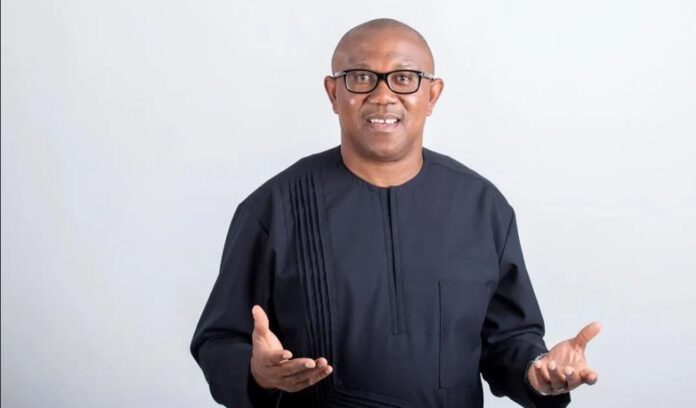Obi explained further that the concept of migrating from consumption to production is to ensure that, as a nation, Nigeria looks beyond oil.
By Jeffrey Agbo
Labour Party presidential candidate, Peter Obi, has spoken further on his consumption-to-production theory following growing interest in it, stating that it is the only option to take the country’s economy out of the woods.
Obi gave further insights on the theory via a series of tweets on Tuesday, noting that it is a three-track plan aimed at achieving Goal 12 of the Sustainable Development Goals (SDG), by ensuring sustainable consumption and production pattern.
He said the thrust of his Presidency, if hired by Nigerians, would be on agriculture and production-centred growth for food security and export, with more emphasis on exporting finished products instead of commodities and raw materials.
Explaining the concept further, Obi disclosed that Nigeria has over 84 million hectares of arable land with only 40% of it cultivated, pointing out that ‘Nigeria’s arable land is her new oil and gold’.
In pursuit of Goal 9 of the SDGs, Obi explained that if elected his administration would from inception, continue to encourage investment in infrastructure – energy, transport, irrigation, and telecoms – to grow these and other sectors.
“We will enforce the legal framework protecting foreign investors and their indigenous partners. This is the only way to temper monopoly and capital flight,” he said.
According to Obi, they will also close the infrastructure gap between now and 2030, with a view to expanding the frontiers of financial inclusion to ensure that SMEs have greater access to credit for their growth.
READ ALSO:
Peter Obi will speed up oil exploration in north — Support group
“We will work with financial institutions to improve their ability to identify credit-worthy borrowers; and support inventory financing, which will help to unlock finance for SMEs dealing with high account receivables,” he said.
Obi explained further that the concept of migrating from consumption to production is to ensure that, as a nation, Nigeria looks beyond oil. “We, therefore, intend to leapfrog Nigeria from oil to the Fourth Industrial Revolution by expanding physical infrastructure through market-driven reforms that will unleash growth-enabling entrepreneurship and market-creating innovations,” he said.
Obi also said that the concept entails that the country ensures sustainability and resilience, and stop borrowing for consumption and channel all loans to be invested in regenerative projects.
“We shall pursue a drastic reduction in the cost of governance and corruption, improve ease of doing business to attract Foreign Direct Investment to jumpstart industrialisation and when borrowing is unavoidable, it will be strictly for production.
“It is also imperative that henceforth, we should strive to operate within available resources and strive for a balanced national budget as cost-saving measures,” the LP flag bearer said.
Obi concluded, “Whatever oil we still have will be refined domestically. These measures along with ending the leakages, including the subsidy regime and improving our tax regime should do the magic of moving Nigeria from consumption to production.”














